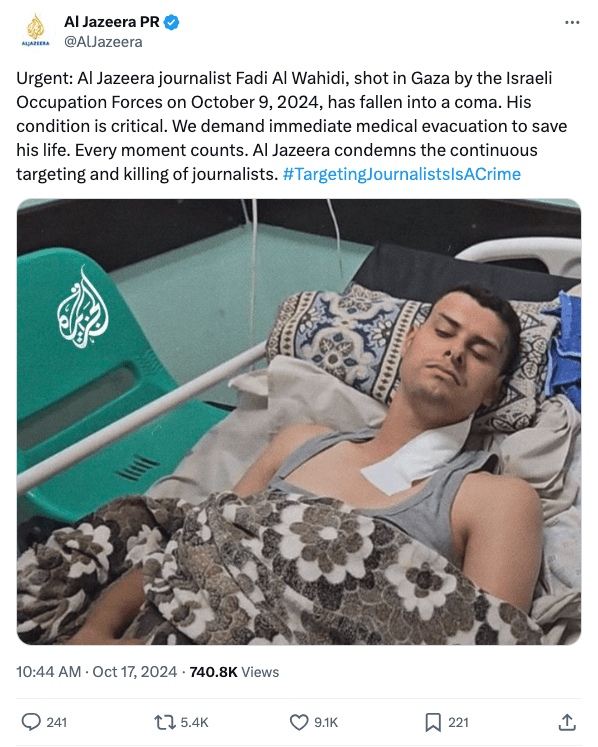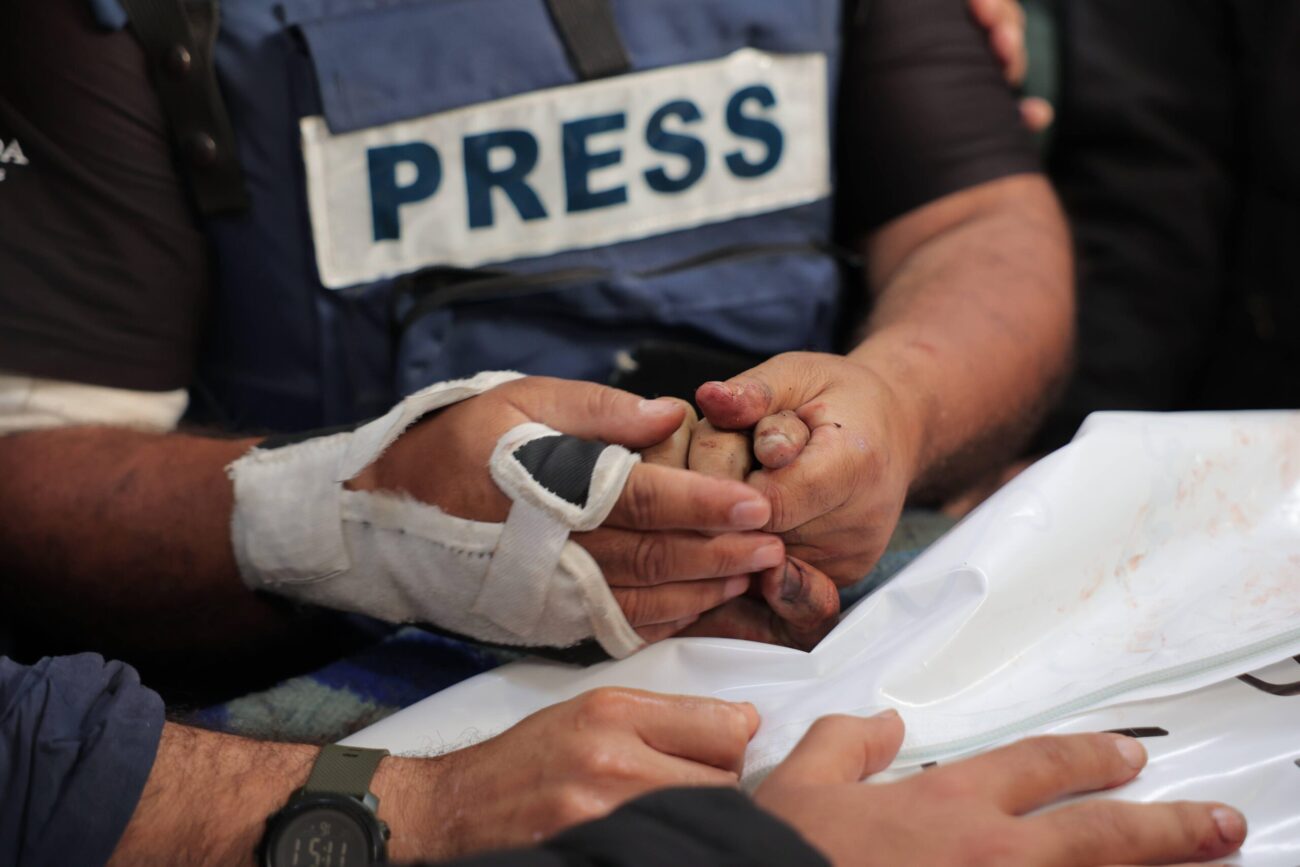The situation in the north of Gaza is hellish, although there are no words to truly describe what is happening as Israeli forces enact a brutal land invasion and siege there.
Over the past 20 days, at least 640 people have been killed, while another 400,000 are trapped with nowhere to go. Hospitals, medical workers and first responders have been targeted, UN schools were set ablaze by Israeli soldiers, and the last remaining fire truck in the north was targeted and destroyed on Wednesday.
Israel has almost entirely cut off aid and supplies from entering the north, and thousands of women and children are now being forced south. The Israeli army has also shared videos of men of various ages stripped, blindfolded and taken away to undisclosed locations.
The UN’s humanitarian chief Joyce Msuya said images from the north “show a traumatized population, running for their lives” as “Palestinians continue to endure unspeakable horrors under siege by Israeli forces”.
Msuya, like the rest of the world, relies heavily on the reporting of a brave cohort of Palestinian journalists putting their lives in danger every day to feed us images and videos of these “unspeakable horrors” inflicted on civilians and the journalists themselves.
Earlier this month, while reporting during the early days of the siege of Jabalia refugee camp, Al Jazeera’s Fadi Al Wahidi was shot in the neck by a quadcopter drone. He was clearly wearing his press vest.

He is now in a coma and Israeli authorities are denying permission for his medical evacuation for urgent treatment to save his life.
Now, Israel wants to silence other reporters in the north by putting a target on their backs.
Reporting in the crosshairs
On Wednesday, the Israeli Defence Forces (IDF) released records alleging six Al Jazeera reporters are “terrorists” with links to militant groups.
Al Jazeera vehemently rejects the claims as an attempt to silence its reporters, as have several of the reporters themselves, putting out social media postings defending their name and their work, as they continue to report from the north, now as marked men.
This is a grave threat Al Jazeera believes could be used as a justification for targeting them. One of the reporters on the list, Ismail Abu Omar, was already severely injured in February after he and his cameraman were hit by a drone. His right leg had to be amputated.
In the last year, the Committee to Protect Journalists estimates that at least 123 journalists and media workers are among the nearly 43,000 confirmed killed in Gaza. This is by far the deadliest period for journalists since the media NGO began gathering data in 1992. The International Federation of Journalists put the number even higher at more than 140.
The Committee to Protect Journalists was also quick to question the allegations, pointing out that this is not the first time that Israel has employed this tactic. The last time, however, was after they targeted and killed reporter Ismail al-Ghoul.
Crying wolf and a targeted campaign
In July, the 27-year-old Al Jazeera reporter, along with freelance cameraman Rami Al Refee, was killed in a drone strike as he was leaving the Al Shati refugee camp near Gaza City in a car.
At the time of his killing, he was married and was the father of a small child.
Days later, the IDF confirmed the strike, claiming al-Ghoul was a member of Hamas. They claimed he received a military ranking in 2007. He would have been just 10 years old.
Al Jazeera also claims that the latest Israeli move is part of a systematic targeting of the Qatari-funded news agency. The facts on the ground would appear to speak truth to this.
The Al Jazeera bureau chief in Gaza and face of the network’s Arabic coverage, Wael Dahdouh, was injured last December in an airstrike that killed his cameraman Samer Abudaqa. Dahdouh’s son Hamza, also a reporter for Al Jazeera, was killed the following month after a car he was travelling in was struck near al-Mawasi, an area marked as a safe zone by the Israeli authorities. Dahdouh had previously lost his wife, two other children and a grandson in another strike on the family home in October 2023.
Veteran Al Jazeera reporter Shireen Abu Akleh was also shot dead by Israeli troops in May 2022 as she covered an IDF raid at the Jenin refugee camp in the West Bank. She was wearing her press vest and standing with a group of reporters. Her colleague, Al Jazeera producer Ali al-Samoudi, was also shot but survived his injuries.
The IDF initially denied responsibility before admitting months later that there was a “high possibility” she was killed by gunfire. Israeli authorities then issued an apology on the anniversary of her death. No criminal charges or prosecutions have been brought to date against any soldiers.
In May 2021, the 11-storey Al-Jalaa building housing Al Jazeera’s bureau in Gaza, as well as residential apartments, was also targeted. The entire building was taken down in an airstrike.
The Israeli army gave a one-hour warning to get out of the building before it was flattened. The IDF used the standard line for justification, that there were “military interests” of Hamas in the building.
This September, Israeli soldiers raided the network’s office in Ramallah and served a notice to shut it down for 45 days. Ramallah is in Area A, the parts of the occupied West Bank under Palestinian control under the Oslo Accords.
The day before the raid, the network had broadcast footage obtained from an offensive Israeli drone shot down over Gaza which showed the drone killing a wounded and immobile Palestinian man by dropping an explosive on him.
This man is just one of thousands killed in Israel’s campaign, one through which the UN Special Rapporteur on human rights in Palestine recently found “reasonable grounds to believe that the threshold indicating that Israel has committed genocide has been met”.
The Gazan people are pleading daily through the screens on our phones, our tablets, our laptops and our TVs for the world to stand up for their lives.
The journalists who are putting their own lives on the line to deliver their message and to document the daily horrors inflicted upon them now also need their Western colleagues to stand up and be counted.
If their call is not heard, like many Western governments, the journalistic profession stands to lose what little integrity it has left.
Further reading
Fintan Drury: Irish businesses need to find their voice on Gaza, and fast


